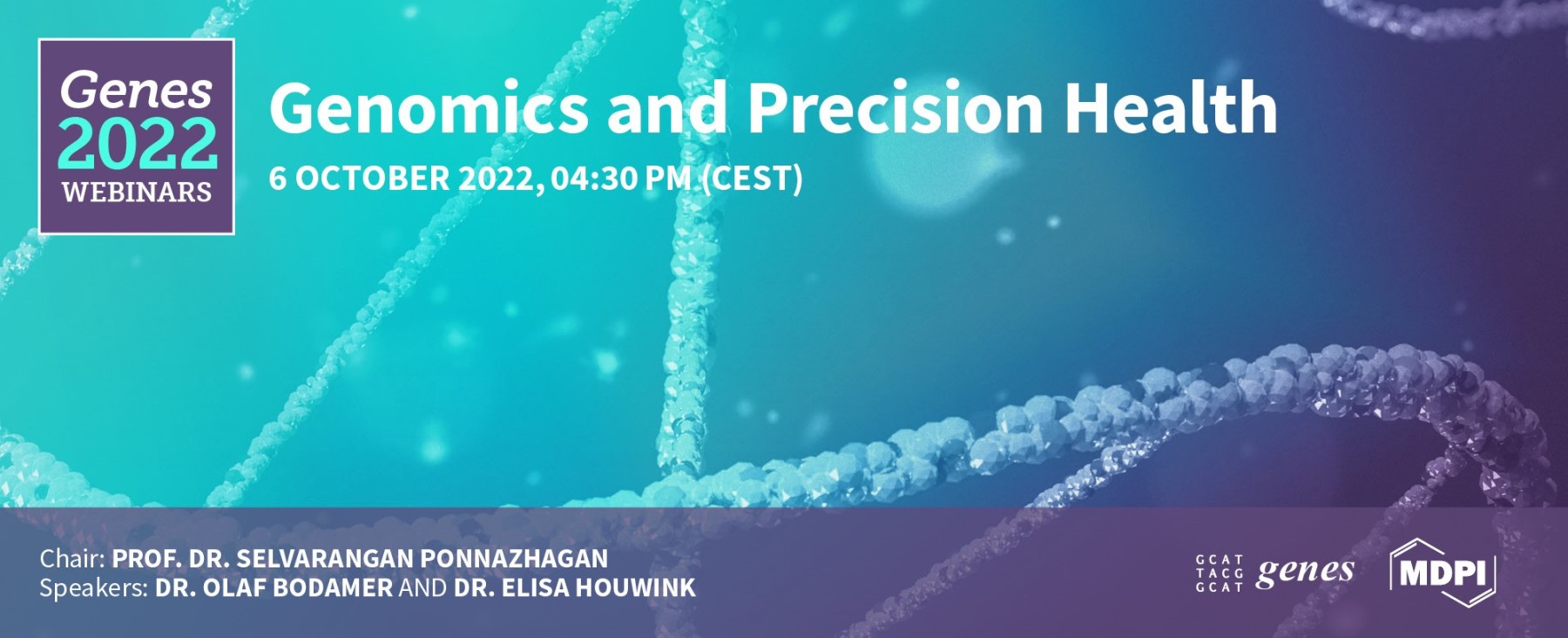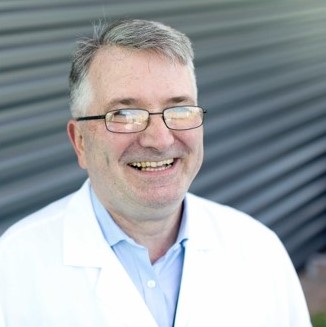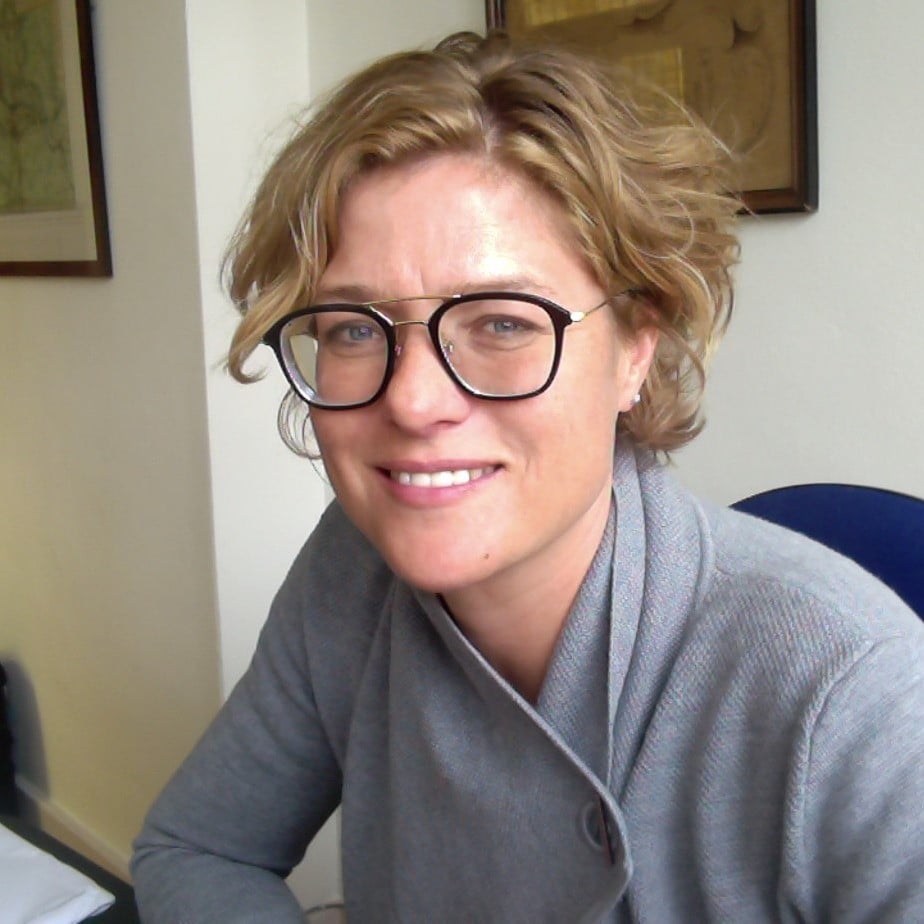
Genes Webinar | Genomics and Precision Health, 6 October 2022
Date: 6 October 2022
Time: 4:30 p.m. CEST | 10:30 a.m. EDT | 10:30 p.m. CST Asia
Webinar ID: 875 9531 5334
Webinar Secretariat: genes.webinar@mdpi.com
Webinar Link:https://genes-2.sciforum.net/
Register for free here:
https://us02web.zoom.us/webinar/register/6016617624627/WN_qHhc0H22QG6cIUFwSalY1w
Chair
|
|
Prof. Dr. Selvarangan Ponnazhagan |
Prof. Dr. Ponnazhagan is a trained molecular geneticist with a focus on cancer. He is currently a Full Professor and holds an Endowed Professorship in Experimental Cancer Therapeutics. The major research areas of Dr. Ponnazhagan’s lab are experimental cancer therapeutics, including stem cell and gene therapy using adeno-associated virus (AAV), tumor microenvironment (TME), and cancer–bone metastasis. In reference to cancer–bone interaction, Dr. Ponnazhagan’s lab models breast cancer to adopt strategies that target tumor cells, immune suppression, and aggressive osteoclast functions. To overcome the limitations in current therapies, his lab developed novel molecular tools and targeted delivery mechanisms, utilizing mesenchymal stem cells as effective therapeutic vehicles for bone remodeling in breast cancer osteolytic pathology. Towards targeting the receptor activator of nuclear factor kappa-B ligand (RANKL) activation using osteoprotegerin (OPG), a decoy receptor for RANKL, without interfering in tumor-necrosis-factor-related apoptosis-inducing ligand (TRAIL)-mediated apoptosis of tumor cells, his lab developed an OPG mutant by structural protein engineering that lacks TRAIL binding affinity and validated in vivo in a disseminated osteolytic malignancy model. His group is the first to identify a subset of immature myeloid cells, known as myeloid-derived suppressor cells, in the TME within the bone, that directly undergo osteoclast differentiation and serve as osteoclast progenitors to enhance bone damage. Recent studies from his lab have established the role of RANKL in activating M2 macrophages in the breast cancer microenvironment and have shown that dampening the effects of elevated RANKL using the OPG mutant resulted in a shift in the immune milieu favoring an anti-tumor cytokine and chemokine response.
Invited Speakers
|
|
Dr. Olaf Bodamer |
Dr. Bodamer was recruited to Boston Children’s Hospital in 2015 as Associate Chief for Genetics and Genomics, where he also has an established translational research laboratory. He is a member of several editorial and scientific advisory boards as well as of patient organizations. Dr. Bodamer has a busy clinical practice at Boston Children’s Hospital where he sees patients of all age groups with complex genetic disorders, including Kabuki syndrome and other disorders of histone modification. In 2017, he founded the Roya Kabuki Program at Boston Children’s Hospital with a focus on integrated clinical care and research to improve health outcomes and identify novel therapies. In addition, Dr. Bodamer is active in several areas of translational genetics and genomics research, in clinical trials and in educational and teaching activities within Harvard Medical School, and he is also an associate member of the Broad Institute of Harvard University and MIT. Since 2021, he has directed the NORD center of excellence for rare diseases at Boston Children’s Hospital.
|
|
Dr. Elisa Houwink |
Dr. Isa Houwink was born on 13 December 1973 in Haarlem, the Netherlands. After she received secondary education at the Barlaeus Gymnasium in Amsterdam, the Netherlands, she successfully passed the Propadeutics in Health Sciences. After obtaining her medical degree in 2003, she started working as a resident at the departments of Obstetrics and Gynecology both in Amsterdam and in Heerlen. She then decided to become a General Practitioner to be able to foster a more personal relationship with her patients and started her residency in Maastricht in 2005. In 2006, she published an accredited written Accredidact CPD module on pre- and postnatal screening together with Prof. Martina Cornel. In 2010, they also published a book on “Genetics in general practice” published by Elsevier in the series of Praktikum Huisartsgeneeskunde. From 2008 until 2013 Dr. Houwink participated in a Ph.D. project in the section Community Genetics, Department of Clinical Genetics (VU University Medical Center Amsterdam) under the supervision of Prof. Martina Cornel and Prof. Geert Jan Dinant (Department of Family Medicine in Maastricht). Her project, funded by the CSG Centre for Society and the Life Sciences /Centre for Medical Systems Biology, aimed to reflect on current genomics developments with primary care workers and to help them identify their learning priorities. On the 20th of December 2013, she defended her thesis "Training in genetics and genomics" Cum Laude. Dr. Houwink worked as an Associate Professor ((Pharmaco)genetics in primary care) at the Leiden University Medical Center and a GP in Kerkrade (GC Terwinselen). In Leiden, her focus was on interprofessional education, (pharmaco)genetics education, implementation and research in primary care, personal genetic lockers, and providing non-genetic healthcare workers clear guidelines and definitions of their responsibilities and roles in addressing genetic risk profiles (common and rare diseases), and she is a member of the Netherlands eHealth Living Lab (NeLL).
We look forward to your participation in this event.
Genes Editorial Office



